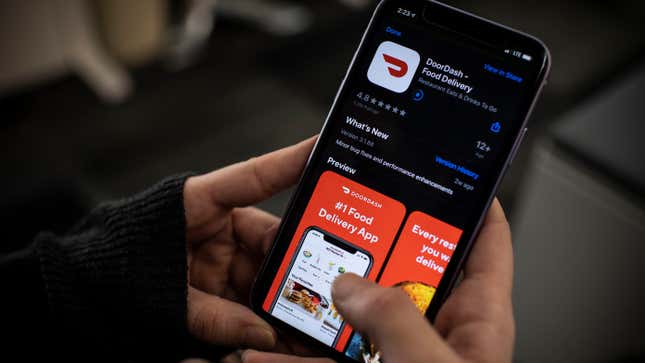
Market-dominating delivery services like Grubhub and DoorDash are seeing unprecedented demand amid covid-19 stay-at-home orders. But these apps presented a threat to the livelihoods of local businesses even prior to the pandemic, and now, cities are stepping in to curb the exorbitant delivery fees these apps have levied on restaurants struggling to stay afloat.
Portland, Ore., is the latest city to introduce fee-regulating policies for third-party apps, with its city council this week unanimously approving a fee cap of 10% per delivery order (whereas fees to restaurants can normally shoot to as high as 30%). The ordinance, which was introduced by Commissioner Chloe Eudaly and co-sponsored by Mayor Ted Wheeler, will cap fees to restaurants at 5% when an order does not require delivery, such as for takeaway.
Portland’s ordinance is among one of the lower fee caps introduced by cities in response to the pandemic. This is great news for restaurants in precarious positions right now as the covid-19 crisis continues, a situation that has not been made easier by hefty fees from third-party apps. But the move is almost certainly going to piss off delivery ghouls that have publicly opposed similar measures in other cities. DoorDash—which said it was raising roughly $400 million in a Series H funding round as of June—called Portland’s ordinance a “drastic regulatory overreach.”
“We’re disappointed that, in the midst of this crisis and when food delivery is more essential than ever, Portland’s City Council has passed a dramatic and arbitrary cap that will have the unintended consequence of reducing sales for local restaurants and earning opportunities for delivery workers,” a DoorDash spokesperson told Gizmodo in a statement by email. “DoorDash doesn’t just connect restaurants to customers: we facilitate the delivery of each order, and commissions help us cover a number of expenses on behalf of restaurants—including paying Dashers who deliver the food.”
A spokesperson for Grubhub, meanwhile, told Gizmodo the company is “frustrated by the lack of transparency and cooperation from the city for not bringing industry voices in earlier to work together on a solution,” arguing that “any cap on fees represents an overstep by local officials and would not withstand a legal challenge.”
Uber Eats also disapproved of the measure, with the company saying it may need to “rethink” its current business model and insinuating the move may impact courier earnings.
“By regulating the way we fund our operations, the city will force us to rethink how we do business—including reducing service areas or increasing consumer-facing fees—which could result in reduced revenue for restaurants, fewer income opportunities for delivery people, and limited access to food delivery for the public,” a spokesperson said by email.
Postmates did not immediately return a request for comment.
An emergency order issued in April in San Francisco stated that delivery apps were required to cap delivery fees to restaurants at 15%, and similar measures have been taken in cities like New York, Los Angeles, and Seattle. Portland’s ordinance will remain in place for the duration of its state of emergency and through a 90-day period after it is lifted.
“Covid-19 has devastated Portland’s restaurant industry,” Wheeler said in a statement this week. “Adding insult to injury, I have heard from countless restaurant owners that third-party delivery apps are profiting at the expense of the restaurant, their employees, and especially drivers. It’s an obvious step to limit delivery fees during a public health crisis, and I want to thank Commissioner Eudaly for partnering together on this.”
Added comment from Uber Eats.